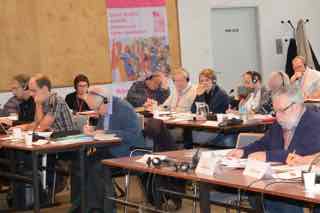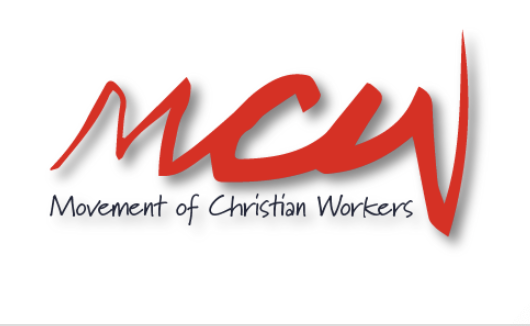
The Final Declaration from the General Assembly of the European Movement of Christian Workers
The seminar of the European Movement of Christian Workers (ECWM) that took place in Strasbourg from the 27 to the 30 October 2015 concluded with a final declaration on the two big subjects of the seminar: A universal basic income within a framework of dignified work and economic solidarity and the current question of refugees.
A Basic Income
In some countries, the debate regarding a basic income has still not yet begun. In contrast, in other countries, it is already quite advanced. When talking about a basic income, we understand this to be an income that enables people to have a minimum income that keeps them above the poverty line and to live a dignified life. This right is not to be linked with work or professional related remuneration. On the other hand, the application of a basic income would avoid the stigmatisation of people who for one reason or another are unable to access the labour market. We must also work to raise the awareness of those who reject a guaranteed basic income. It’s important they understand that its implementation will not make the beneficiary non productive for wider society. We consider that a guaranteed basic income is indispensable today because in a number of cases, remuneration from work does not give the necessary income to live in dignity. We note that the world today is evolving towards a new technological paradigm in the way that society is organised, no longer providing employment for all. The current crisis has driven numerous companies to reduce the size of their workforce, whilst demanding their work force works overtime. At the same time there is a large number of long term unemployed workers who feel they have an undignified life due to their situation. Workers have the right to live in dignity and to be free to choose their work. To do this , we need to ensure a sufficient source of income. The solution would involve the application of a basic income financed through a redistribution of wealth. As a Christian workers movement , we must follow the gospels and various documents of the Magisterium of the Church’s social teaching, encyclicals , etc, recognising that Jesus is always at the centre. As representatives of the Movement of Christian Workers in Europe we have to demand that the human person must take precedent over that of capital. Basic income therefore must meet the needs arising from the three fundamental pillars of the social Magisterium of the Church : the dignity of the person, the common good and the universal destiny of goods. The members movements of the ECWM note that basic income is central to their releflections and preoccupations about workers. The current threats to decent work and decent life require concrete policy responses. We want to change the situation with and for all workers, whether in Europe or elsewhere. We demonstrate our concern for them through solidarity. The members movements offer this reflection to their members wishing to join networks that defend the demand for a basic income in their country and want to convey this concept to social organizations, trades unions and political , through direct dialogue or by the members of our movements who are engaged in social and community organisations. As ECWM we wish to coordinate with other European bodies so that this debate is put on the agenda of political structures, trades unions and the church , and we suggest that the WMCW could bring the debate to global organizations working in the field politics , the church and trades unions.
Refugees
Europe and its citizens are currently facing a completely new situation:...........
Many of our countries are overwhelmed by a real migration of peoples. Reinforced by the horrors perpetrated in Africa and the Middle East, this stream of ever increasing refugees continues unabated. And when these men and women driven by great hope, finally reach their destination, they face not only their own trauma, but also exaggerated bureaucracy with long waiting times, inhumane conditions, poor housing and health care; rejected by parts of the population and, according to some reports, violence perpatratred the civil authorities. Ultimately , this refugee crisis is a challenge for all of Europe : Does the Christian heritage of the continent , constantly refered to by social, religious and political leaders, are they able to cope with these challenges? On this occasion , we should say a thank you, especially to those who work tirelessly often on a voluntary basis - to help these men and women, a Christian and human image of Europe, in which they put their hope. Apart from all the difficulties mentioned, these men and women who are left within an uncertain future, are entitled to welfare just like us. Welfare that we consider a right - they are entitled to adequate primary care, so they can not only recover their dignity and humanity, but that they too can have the chance to look beyond their uncertain future with new aquired confidence.
Strasbourg, October 2015 www.mtce-network.eu




